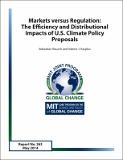| dc.contributor.author | Rausch, S. | |
| dc.contributor.author | Karplus, V.J. | |
| dc.date.accessioned | 2014-11-05T15:55:18Z | |
| dc.date.available | 2014-11-05T15:55:18Z | |
| dc.date.issued | 2014-05 | |
| dc.identifier.uri | http://hdl.handle.net/1721.1/91460 | |
| dc.description.abstract | Regulatory measures have proven the favored approach to climate change mitigation in the U.S., while market-based policies have gained little traction. Using a model that resolves the U.S. economy by region, income category, and sector-specific technology deployment opportunities, this paper studies the magnitude and distribution of economic impacts under regulatory versus market-based approaches. We quantify heterogeneity in the national response to regulatory policies, including a fuel economy standard and a clean or renewable electricity standard, and compare these to a cap–and–trade system targeting carbon dioxide or all greenhouse gases. We find that the regulatory policies substantially exceed the cost of a cap–and–trade system at the national level. We further show that the regulatory policies yield large cost disparities across regions and income groups, which are exaggerated by the difficulty of implementing revenue recycling provisions under regulatory policy designs. | en_US |
| dc.description.sponsorship | We acknowledge support of the MIT Joint Program on the Science and Policy of Global Change through a combination of government, industry, and foundation funding, the MIT Energy Initiative, and additional support for this work from a coalition of industrial sponsors. This work is also supported by the DOE Integrated Assessment Grant (DE-FG02-94ER61937). For development of the USREP-ReEDS model, the authors further acknowledge the support of the Joint Institute for Strategic Energy Analysis, which is operated by the Alliance for Sustainable Energy, LLC, on behalf of the U.S. Department of Energy’s National Renewable Energy Laboratory, the University of Colorado-Boulder, the Colorado School of Mines, the Colorado State University, the Massachusetts Institute of Technology, and Stanford University. | en_US |
| dc.language.iso | en_US | en_US |
| dc.publisher | MIT Joint Program on the Science and Policy of Global Change | en_US |
| dc.relation.ispartofseries | MIT Joint Program Report Series;263 | |
| dc.title | Markets versus Regulation: The Efficiency and Distributional Impacts of U.S. Climate Policy Proposals | en_US |
| dc.type | Technical Report | en_US |
| dc.identifier.citation | Report 263 | en_US |
